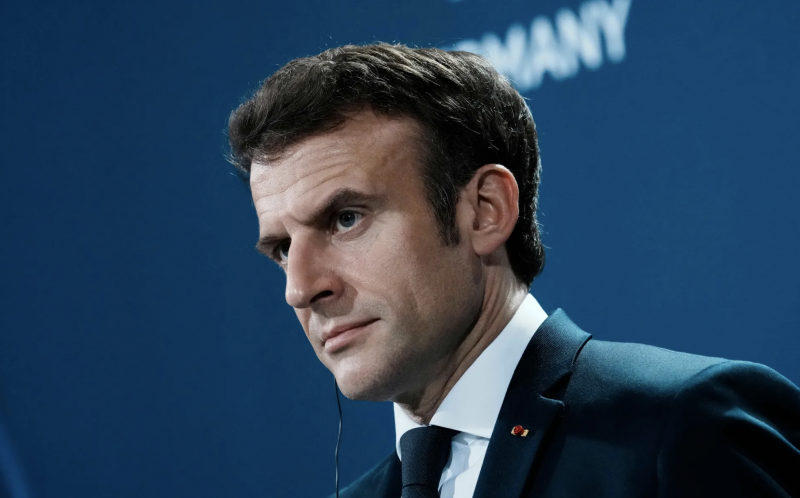
French President Emmanuel Macron. (Credit: Thibault Camus/AFP via Getty Images)
French President Emmanuel Macron is the only prominent leader to have visited Lebanon over the last three years, underscoring both the country’s diplomatic isolation and France’s attempts to help.
While many Lebanese people are undoubtedly grateful for this, it does not excuse all his actions.
Macron has led an at times inconsistent and difficult-to-follow policy in the country since his visit after the 2020 Beirut port explosion.
Instead of producing the desired outcomes, this inconsistent policy has weakened France’s image among its main allies and conduits of influence in Lebanon, even fueling various conspiracy theories.
At first, the French policy was understandable, as it aimed to quickly restore stability to Lebanon and pressure the political elite to enact necessary reforms. France was willing to compromise to prevent the institutional collapse of the last country in the Middle East in which it wields some influence.
However, after nearly three years, no meaningful reforms have been enacted and Lebanon’s situation continues to deteriorate with no sign of short or medium-term improvement.
Despite this, Paris has failed to change its policy in Lebanon. In fact, it now openly endorses Sleiman Frangieh’s candidacy for the presidency in the name of “pragmatism.”
Frangieh, the leader of Lebanon’s Marada Movement, was invited to the French capital on Friday to offer assurances to Saudi Arabia, which is currently the main obstacle to his ascension to power in Baabda.
The pertinent question is: how did Macron, who in December 2022 called on Lebanon to change its leadership and remove the politicians blocking reforms, find himself promoting a Hezbollah-endorsed candidate to the Saudis and a significant part of the Lebanese political spectrum?
How did his advisors, including former ambassadors to Lebanon, convince him that this was the best course of action for the presidential issue?
France is determined to prevent any prolonged presidential vacuum in Lebanon and believes that concessions to Hezbollah are necessary to enable reformist candidate Nawaf Salam to become prime minister.
Frangieh is considered a reasonable concession for two reasons: he is committed to maintaining good relations with Arab countries and unlike former President Michel Aoun, he understands his limitations and political weight.
In other words, he is unlikely to paralyze the government formation process for months to obtain a larger share of power.
While this rationale may justify considering Frangieh’s candidacy, it is not justifiable to cling to it despite the numerous obstacles and play into Hezbollah’s hands.
By doing so, Hassan Nasrallah’s party, which has previously shown a willingness to compromise, may become less inclined to do so.
It is undeniable that no president can be elected in Baabda without Hezbollah’s endorsement. However, rather than trying to override it, negotiation from a position of strength, as Saudi Arabia is currently doing, is the better approach.
By doing the opposite, France is reducing the possibility of changing the Lebanese equation and allowing for the election of a “neutral” president and a reformist prime minister.
While it is true that Frangieh is a man of his word and can be engaged in dialogue, his candidacy poses several major problems. His geopolitical positioning, friendship with Syrian President Bashar al-Assad, lack of knowledge on economic issues, and lack of support from either of the two major Christian parties are all concerns.
Symbolically, the election of Zgharta’s strongman could be seen as a sign of weakened influence wielded by the country’s Christians at a time when calls for federalism are rising within this community. His election would also leave a bitter taste for a large portion of the youth, almost four years after the October 2019 uprising.
France seems to be banking on the Saudi-Iranian rapprochement to endorse Frangieh’s candidacy. However, given the uncertainty of the region’s future and the potential for an Israeli-Iranian escalation, it is difficult to predict how Frangieh would react. This risk should not be overlooked.
Lebanon is currently facing two vetoes: one from Hezbollah and Iran, and another from the Saudi kingdom.
The former has the ability to paralyze the country for years in order to achieve its goals. The latter will not provide any assistance to Lebanon if the situation does not develop in the direction it wants.
While Hezbollah can inflict harm, Saudi Arabia may be able to alleviate suffering.
Although no one wants the presidential vacuum to persist, we are all aware of the potential consequences if Hezbollah prevails — all of us, except Macron, apparently.
This article was originally published in French in L'Orient-Le Jour. Translation by Sahar Ghoussoub.